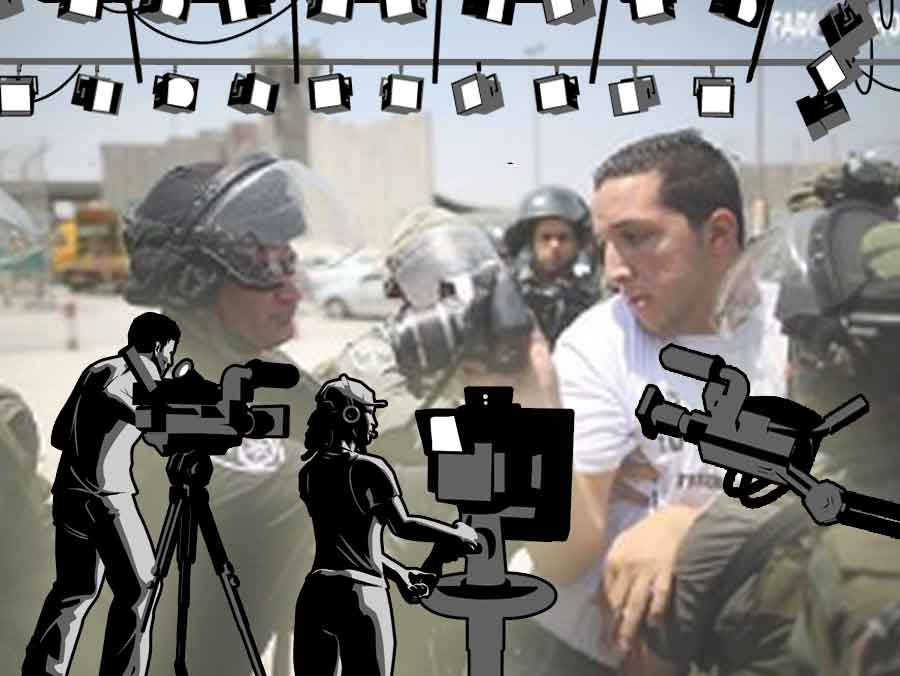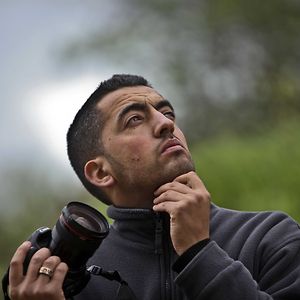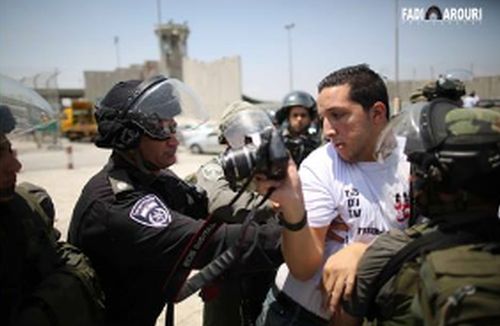July 31, 2013 15:01
by Pesach Benson

And that raises questions about his association with the Reuters wire service and China’s Xinhua News Agency. HonestReporting has learned Reuters fired Arouri, apparently over his extra-curricular activities, but the wire service continues to use his work on a free lance basis.
Anti-Normalization Infects The Palestinian Media
The anti-normalization campaign condemns Israeli-Palestinian events whether they are political, business, or academic. Even children’s sporting events are taboo. All such activities, it is argued, “legitimize the Israeli occupation.”
This rejectionism has taken over the Palestinian Journalists Syndicate (PJS). That’s why in recent weeks, Israeli reporters and employees of Israeli news services working in the West Bank have faced increasing hostility. The PJS claims it’s fighting for freedom of movement in Israel.
Freedom of movement for journalists is certainly reasonable — but coming from this crowd, it’s a difficult argument to hear. The same journalists opposed to normalization are demanding Israeli travel permits and Israeli press credentials so they can work inside Israel, and interview the same Israelis they refuse to even let their kids play soccer with.
Fadi Arouri Crosses the Line

Fadi Arouri
HonestReporting has learned that Fadi Arouri’s activities in the anti-normalization campaign go beyond legitimate activism, and have crossed over into his professional work. He works for Xinhua and has a free lance relationship with Reuters. He photography has appeared in AP, Apollo Images, Maan News, and Al-Ayyam.
One Palestinian journalist discussed Arouri with HonestReporting on condition of anonymity because he didn’t want his criticisms to be construed as personal. He described several troubling incidents the photographer was directly involved in:
1. On July 17, “Arouri and his friends organized a march of Palestinian journalists to the Qalandiya checkpoint, where they staged a confrontation with Israeli soldiers,” HonestReporting was told.
“They shouted at the soldiers so they could sell the photos. Looking at the photos, its looks like Arouri and his friends took turns confronting soldiers so they could photograph each other. That’s not a real protest. That’s a circus.”
The Bethlehem-based Maan News Agency published what amounted to a photo essay.
And the International Federation of Journalists denounced the IDF for its “harsh restrictions” and “brutal behavior.” According to the IFJ, seven journos were injured. Here’s an example of one photo Arouri shot and posted on Facebook.

#IOF Soldiers Attacks Dozens of #Palestinian Journalists As they attempt to cross to #Jerusalem #Right_of_Movement #ifj @IFJGlobal #Qalandiya Checkpoint
2. In May, 2012, “the US consulate organized an event in Ramallah for International Press Freedom Day, and Arouri led the campaign against the Americans,” HonestReporting was told. “He didn’t want Palestinians attending the event because it was arranged by the Americans. Arouri views America as the enemy. This has nothing to do with Israel. That event was covered by the international media. It was a case of journalists staging an event and then covering it.”
Indeed, the Fatah-affiliated Al Aqsa Press quoted Arouri as one of the protest organizers:
Fadi Arouri, one of the Palestinian journalists said, that the journalists agreed to stage a sit-in protest against the event organized by the US consulate. He noted that the Palestinian Journalists Syndicate, which represents all journalists of different political backgrounds, had called for boycotting the event in solidarity with the Palestinian prisoners.
Despite this hatred of the US, Arouri got a plum assignment later on. In March, 2013, the PA-run Palestinian Press Office selected Arouri to be the pool photographer shooting Secretary of State John Kerry’s visit to Ramallah. (To avoid unwieldy hordes of photographers at high-profile events, a pool photographer usually selected on a rotation basis covers the event and distributes his images world wide with no exclusivity.)

Mohammed Najib
3. This past Sunday, Mohammed Najib, a veteran Palestinian journalist who works for the new Israeli TV station, I24 News, “was working in downtown Ramallah interviewing people on the street when, Arouri showed up, started inciting people against him. Aurori told people not to talk to Najib because he works for an Israeli propaganda organization. People gathered around, and he couldn’t continue working for fear of his life.”
HonestReporting was told Najib intends to file a formal complaint with the Palestinian security services and the PJS. His only recourse is to through “traditional tribal justice,” and even that may not make much difference, HonestReporting was told. “They come from the same village of Aroura, so the village elders have been asked to mediate. But an apology won’t make any difference because the damage has already been done. And an apology won’t help the next Israeli journalist attacked in the West Bank.”
4. Israeli journalist Yoram Cohen was in Ramallah covering a press conference when Palestinian journalists protested against his presence. At the time, the Jerusalem Post wrote:
Cohen’s attempt to explain that he had received permission from the PA deputy minister of information to cover the press conference did not persuade the journalists, who demanded that he leave immediately. The PA official has since denied granting Cohen permission.
HonestReporting was told “Arouri was one of the initiators.”

Fadi al-Arouri, a Palestinian journalist involved in the anti-normalization campaign, said that the opening of a Fox branch in Ramallah was a “stain of disgrace in light of calls for boycotting the state of occupation and its products.”
Arouri accused the PA’s Economy Ministry of facilitating the entry of Israeli products to the Palestinian market by giving Israeli companies and merchants permits to work in the Palestinian territories.
HonestReporting was told, “Arouri’s entitled to his views, but once he becomes a real activist, it becomes very unethical for Xinhua, Reuters or any other media outlet, to rely on him. If he’s involved in political activities, it’s an ethical problem. Would Reuters ever hire a settler to be their Jerusalem correspondent?”
Ethical Questions
Aurori has irresponsibly blurred the line between journalism and activism, raising important questions for the journalism community.
Why do Xinhua and Reuters continue their association with him?
What’s the real reason Palestinian journalists against normalization want to work in Israel?
Who were the other photographers who marched to the Qalandiya checkpoint? And which news services are they employed by?
Is the International Federation of Journalists prepared to condemn Arouri and the other photographers as quickly as it denounced Israel?
Is the journalism community prepared to speak out against Arouri?
How should Israeli journalists respond to intimidation by their Palestinian counterparts?
How reliable are Palestinian pool photographers? Can US officials object to the PPO’s choices?
Related Reading
For more on issues of photo bias, see these reports:
(Image of Arouri via Vimeo/Fadi Arouri, Najib via LinkedIn/Mohammed Najib)
Source material can be found at this site.












